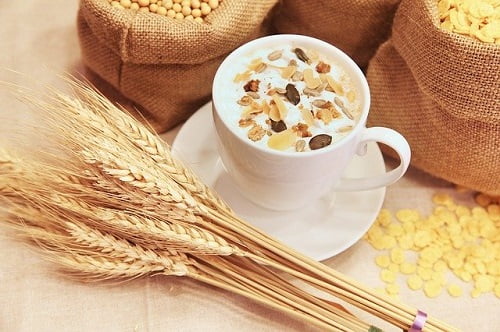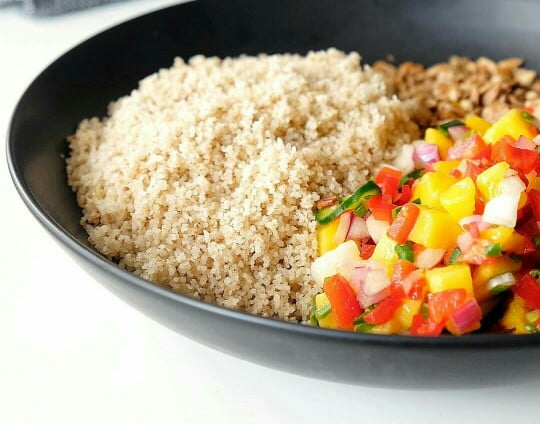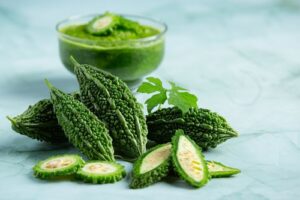Finding the best foods to boost breast milk supply in Nigeria can be stressful, as most of our foods are rich in carbohydrates but low in essential nutrients.
Read on to discover the best foods that will help increase your breast milk production. And learn simple tips that will support you in your breastfeeding journey.
Foods that Increase Breast Milk Production in Nigeria
The following foods are rich in nutrients that are important for breastfeeding mothers and their babies. They include:
1. Oatmeal
Oats are a great galactagogue. Galactagogues are foods that help increase milk supply.
They are rich in beta-glucan, a type of dietary fiber that boosts milk production and reduces cholesterol levels in the blood [1]
You can top them with fruits, yogurt, or even make cookies with them.
2. Pap (Akamu, Ogi)
Pap is incredibly nutritious and filling. Many Nigerian moms have testified of its milk-boosting properties.
It is made with fermented maize, sorghum, and pearl millet. And is rich in carbs, protein, B-vitamins, calcium, potassium, and magnesium.
To boost milk production with pap, enrich it with milk or yogurt, make it with lots of water, and drink it while it is still warm.
Also read: Akamu (Ogi): 10 Exciting Benefits for You and Baby
3. Millet drink (Kunu)
Kunu is a popular drink that has been in use to boost breast milk supply in northern Nigeria since ancient times.
The drink is made with slightly fermented millet, sorghum (guinea corn), rice, tiger nuts, and ginger.
It is a good source of nourishment for baby and mother. And is rich in protein, carbs, B-vitamins, calcium, and antioxidants.
4. Brown Rice
Just like other whole grains, brown rice is rich in beta-glucan which helps boosts lactation in new moms.
Its rich dietary fiber content will nourish your baby, provide you with energy, and prevent overeating.
In Nigeria, you can substitute brown rice with brown Ofada rice. Just make sure to serve it with lots of vegetables and tomato sauce.
5. Milk and Millet Gruel
Just like kunu, milk and millet gruel is a staple drink originating from northern Nigeria, where it is called “Fura de Nunu”.
It is a healthy mix of Nunu (fermented cow milk) and Fura (whole grain millet dough).
The gruel is very filling and nutritious. It is rich in protein, fats, calcium, and other essential nutrients that will nourish you and your little one.
6. Fonio
Fonio commonly called acha is a nutritious whole grain that is good for breastfeeding women and babies.
It is an excellent source of protein, B-vitamins, iron, calcium, and dietary fiber.
You can eat it like couscous or as a breakfast cereal.
Also read: Acha (Fonio): 7 Amazing Health Benefits and Nutrition
7. Brewers Yeast
Brewer’s yeast is a healthy fungus supplement that has been used for centuries to increase breast milk production in new moms.
It is rich in B-vitamins, protein, iron, chromium, selenium, and other important minerals.
You can take brewer’s yeast as a tablet, powder, or add it to your baked goods. It is one of the main ingredients in lactation cookies.
8. Sweet Potatoes
Sweet potatoes contain complex carbs that help increase energy and fight fatigue in new moms.
They’re also excellent sources of vitamin A – a vital nutrient that promotes healthy vision and immune system development in babies.
You can substitute the common Nigerian cassava or yam fufu with sweet potato fufu. It’s incredibly delicious!
9. Protein-rich Foods
Protein is vital for breast milk production.
During breastfeeding, women require an additional 25 grams of proteins [2], and this is passed from the mother to support growth and development in the baby.
Examples of protein-rich foods to add to your diet include:
- Lean meat (goat meat, snails, gizzard, beef)
- Fish
- Eggs
- Seafood
- Soybeans
- Nuts and seeds
10. Beans and Legumes
Beans are a great addition to the diet of a breastfeeding woman.
They are good sources of protein, folic acid, B-vitamins, iron, and dietary fiber.
Beans will keep you full for longer periods, prevent overeating, and ensure your baby gets the right nourishment.
Also, they’re very versatile and easy to incorporate into so many meals.
Also read: 10 proven reasons why your diet needs Black-eyed peas (Cowpeas)
11. Watermelon
Watermelon contains 90% water and 30 calories per 100 grams.
Its high water content will help you stay hydrated, keep your milk flowing, and prevent overeating.
You can eat them as a snack or add them to your breakfast smoothies.
12. Carrots
Carrots contain 88% water and 41 calories per 100 grams.
They are also an excellent source of beta-carotene – a compound that converts into vitamin A in the body.
In addition, their high fiber and water content will keep you rehydrated and boost your breast milk supply.
13. Green Unripe Papaya
Unripe papaya has been in use as a galactagogue in India and other Asian countries.
They are rich in vitamin A, antioxidants, and enzymes that support breastfeeding women and babies [3].
Recent studies say that it contains phytochemicals that cause mild sedation, helping you relax [4].
You can eat them raw with cereal or yogurt, or have them in your salads.
However, pregnant mothers should avoid unripe papayas as they can cause premature labor.
Also read: Best Nigerian foods to eat during pregnancy and what to avoid
14. Moringa Leaves
Moringa leaves contain rich amounts of iron and calcium – two important minerals needed to prevent anemia and strengthen bones during breastfeeding.
Studies have also found that Moringa may help increase breast milk supply by stimulating the mammary glands to produce more milk [5]
You can use moringa as a vegetable in your soups, stews, or make moringa tea.
Also read: Moringa: Benefits for Health, Hair, Skin, and Men.
15. Bitter Leaf Soup
Bitter leaf soup may not be the most popular of foods, but its high water and fiber content can boost breast milk production. And reduce constipation in new moms.
Also, the soup is a popular galactagogue among the Igbo people of southeastern Nigeria. Its use to increase and maintain milk production dates back to ancient times.
You can enjoy the soup with fufu or make a juice with the washed leaves.
Also read: Bitter leaf (Vernonia amygdalina): Benefits, Uses, and Side effects
16. Fenugreek
Fenugreek is a common ingredient in nursing teas and supplements.
It is high in phytoestrogens that boost your immune system and increases milk supply [6].
However, if you have heart disease, type II diabetes, or legume allergies, consult a doctor before using fenugreek.
17. Garlic
Garlic is a healthy addition to most diets. It promotes digestion and is believed to help nursing mothers produce more breast milk.
Although garlic has a strong odor that goes into breast milk, most infants like the taste and tend to breastfeed for longer time periods [7].
However, discontinue if your baby shows signs of sensitivity after you eat garlic.
You can use garlic to flavor your soups, stews, meats, and seafood.
18. Ginger
In Asian culture, ginger is a popular galactagogue believed to increase breast milk supply and improve milk let-down [8]
You can brew your tea with ginger or add fresh ginger to your soups and stews.
19. Nuts
Nuts like cashew, almonds, and groundnuts are generally considered great galactagogues.
They’re full of protein, omega-3 fatty acids, calcium, iron, zinc, and B vitamins.
You can eat them raw as snacks or add them to your cookies, muffins, and cakes.
20. Sesame Seeds
Sesame seeds are high in calcium, protein, iron, B-vitamins, and antioxidants.
Studies have found that sesame seeds may promote the secretion of prolactin – the hormone responsible for breast growth and milk production [9].
You can eat sesame seeds alone, or as a topping for salads, cookies, bread, and cakes.
21. Water
Finally, the most important! Most moms overlook the value of water during breastfeeding.
It is essentially the basis of increasing your milk supply once you eat the right foods.
Additionally, hydration is super important to reduce fatigue, aid postpartum weight loss, and strengthen your immunity.
You can start by drinking a minimum of eight glasses of water every day.
Foods to Avoid While Breastfeeding
Over the years, many women have discovered that certain foods and beverages reduce their breast milk supply or cause their baby to be fussy.
Foods and drugs to avoid include:
- Alcohol: It is best to avoid alcoholic beverages like palm wine and beer during breastfeeding, but if you must drink palm wine, make sure that it’s freshly tapped – as stale palm wine is often loaded with lots of sugar and alcohol.
- Caffeine: Avoid products with a high caffeine content, like black tea, green tea, and coffee.
- Herbs: Including peppermint, sage, parsley, lemon balm, and oregano
- Medications: Cold and allergy medications containing pseudoephedrine may decrease milk supply.
- Spices: Some women notice extra fussiness in the baby when they consume large quantities of cinnamon and chili
Other Healthful Tips to Boost Milk Production
A balanced diet, sufficient sleep, and adequate hydration could help maintain the optimum supply of milk during lactation. Other practices that can ensure constant supply include:
- Breastfeeding soon after delivery
- Nursing frequently every two to three hours
- Ensuring that your baby’s latch is effective
- Reducing stress levels and getting plenty of rest
- Staying hydrated with lots of water and juice
- Expressing milk after feeding to maintain supply
- Wearing a well-fitted bra
- Feeding the baby from both breasts by switching sides
- Avoiding the use of bottles and pacifiers
- Massaging your breasts during feeding to promote milk let-down
- Consulting a lactation expert if nursing issues persist
- Consulting your pharmacist or doctor on the medications you’re taking
The Bottom Line
Creating a food timetable of lactogenic Nigerian foods will help you make good, healthy eating decisions.
Just make sure you select the foods that work best for you and your individual tastes.
Also, ensure to adjust your lifestyle and avoid processed foods, but most importantly, enjoy breastfeeding as it can be a wonderful experience.
Did you find this post helpful? Leave your questions below and don’t forget to share!
Sources
- Grundy, Myriam M L et al. “The impact of oat structure and β-glucan on in vitro lipid digestion.” Journal of functional foods (2017)
- Kominiarek, Michelle A, and Priya Rajan. “Nutrition Recommendations in Pregnancy and Lactation.” The Medical clinics of North America (2016)
- Ncube, T N et al. “Supplementing lactating women with puréed papaya and grated carrots improved vitamin A status in a placebo-controlled trial.” The Journal of nutrition (2001)
- Kebebew, Zerihun, and Workineh Shibeshi. “Evaluation of anxiolytic and sedative effects of 80% ethanolic Carica papaya L. (Caricaceae) pulp extract in mice.” Journal of ethnopharmacology (2013)
- Drugs and Lactation Database (LactMed). Bethesda (MD): National Library of Medicine (US); 2006-. Moringa.
- Drugs and Lactation Database (LactMed). Bethesda (MD): National Library of Medicine (US); 2006-. Fenugreek.
- Mennella, J., Beauchamp, G. The Effects of Repeated Exposure to Garlic-Flavored Milk on the Nursling’s Behavior. Pediatr Res (1993)
- Panwara Paritakul, et al. Breastfeeding Medicine. Sep 2016.
- S J Al-Bazii et al. 2019 IOP Conf. Ser.: Mater. Sci. Eng.
Get new free and exclusive health tips delivered straight to your inbox!







